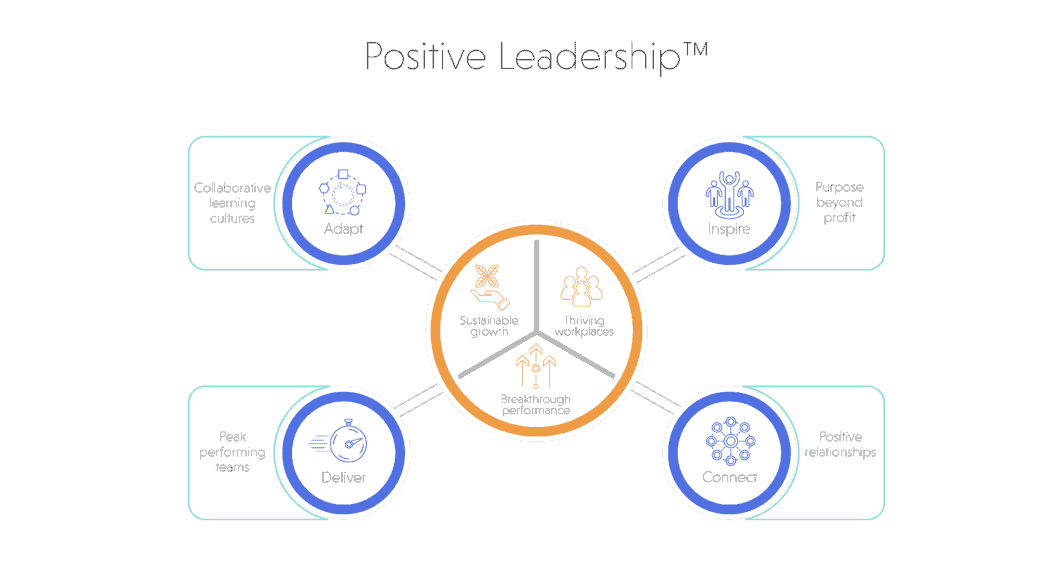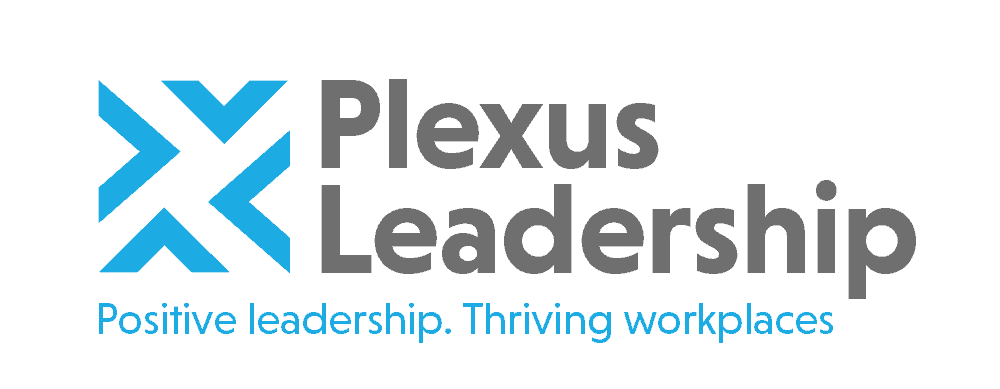Positive leadership is a leadership approach that helps leaders, teams and organizations achieve breakthrough performance, thriving workplaces and sustainable growth in times of volatility, uncertainty and change.
Positive leaders inspire people with a meaningful purpose beyond profit, create connected organizations built around positive beliefs and relationships, deliver exceptional results through peak performing teams and accelerate adaptation to changes and disruptive forces with collaborative learning cultures.
 Because it focuses on building positive capabilities and capacities – emotions, relationships and behaviours – positive leadership strengthens people’s ability to adapt to change and perform effectively under pressure. It enables them to develop vital psychological capacities including resilience, agility, grit (the ability to remain focused and persevere under pressure) and motivation. This accelerates their adaptation in response to both anticipated challenges, but also unanticipated crises like COVID-19.
Because it focuses on building positive capabilities and capacities – emotions, relationships and behaviours – positive leadership strengthens people’s ability to adapt to change and perform effectively under pressure. It enables them to develop vital psychological capacities including resilience, agility, grit (the ability to remain focused and persevere under pressure) and motivation. This accelerates their adaptation in response to both anticipated challenges, but also unanticipated crises like COVID-19.
By developing positive leadership organizations will be better equipped to deal with four major challenges facing every business today:
I. The purpose challenge: Why are we here? What value are we creating for customers? What do we want to be known for?
II. The talent challenge: How do we find, motivate, retain and develop the best talent?
III. The productivity challenge: How can we do more with less by deploying our people and resources in smarter ways?
IV. The adaptation challenge: How do we best anticipate and respond to changes and disruptive forces? How do we accelerate innovation?
What positive leadership is not
It is important to be clear that positive leadership does not involve creating artificially happy workforces where everyone is expected to smile and show up at work positive every day. It also does not mean leaders should become cheerleaders or crowd-pleasers for their teams and organizations. In fact, trying to create happy workplaces can be counterproductive as people can be happy without being productive and challenged. Suppressing emotions at work, including those that are often labelled “negative” such as sadness, anger or frustration also results in higher levels of unhealthy stress and demotivation, as people find it difficult to shut down their natural feelings. Doing this creates inner tension and conflict, especially when they are required to suppress their feelings over prolonged periods.
The importance of mindset and beliefs
At its core, positive leadership involves a shift in the belief system for many leaders, from seeing people as resources or assets who are expendable to seeing them as the key value-multipliers of the business. Secondly, it involves a shift from a focus on problems and weaknesses to more attention being given to strengths, possibilities and opportunities. Finally, it requires leaders and managers to shift away from the belief that their primary role is that of expert, instructor and chief problem-solver. Rather, they need to embrace a different identity and purpose, regarding themselves as talent enabler, coach and change accelerator. In a world that is so uncertain, complex and fast-paced, leaders who rely too much on authority-based power (and all the beliefs and assumptions associated with this) will soon find that they become irrelevant and obsolete.
Based on decades of experience developing positive leadership, we recommend the following 4 powerful practices leaders can learn to build thriving work cultures and peak performance:
1. Build a purpose beyond profit
Organizations with a compelling purpose beyond profit will find it easier to recruit and retain people who are wanting to make a difference by contributing to that vision. The purpose should describe the company’s reason for being, the value the business will deliver to customers and how it will conduct itself. Clarifying a straightforward and meaningful purpose will inspire belonging, hope and optimism among employees that they can make a real difference, provided they are empowered to contribute their expertise, ideas and views in working towards this purpose.
Because doing right is an increasingly important driver of doing well in business, positive leaders also emphasize the importance of conducting business in a responsible, ethical and inclusive way. They embrace with vigour the new focus on environmental, social and governance (ESG) goals as they understand this will yield strong dividends in terms of customer loyalty, talent attraction and retention and financial results. They recognize that global investor momentum behind ESG is growing fast and that access to new capital will increasingly be dependent on ESG performance, not just on having robust short-term financial results.
2. Be honest about the realities, amp up the positives
It is not just coronavirus that is testing leaders. They are increasingly facing tough challenges and disruptive changes and many of these are tough or impossible to predict, the co-called “Black Swan events” like COVID-19. Choosing how to respond in any given situation is a “moment of truth” for leaders which shapes how they are perceived and their impact on the organization’s results.
The COVID crisis provides a good lesson for leaders. Positive leaders who have done the best job dealing with the crisis like Jacinda Ardhern, the PM of New Zealand, acknowledged the realities very early and called for swift, decisive action including lockdown, testing and contact tracing, based on the scientific advice and data at the time. She did not try to dispute or devalue the views of her scientific advisors, she trusted and listened to them. She has also demonstrated deep empathy and compassion for all those impacted, especially families who have lost loved ones. However, she has also continuously stressed the importance of working together to defeat the crisis, telling the public that the country will get through the crisis and emerge stronger than before.
This is very typical of what positive leaders do. They focus on the realities, however, amplify what is already working well. They make a conscious choice to focus on strengths, successes and possibilities, setting off a powerful chain reaction of positive emotions including hope, optimism and resilience. This amplifies positive behaviours including collaboration, creativity, rapid learning and higher levels of effort, in turn fuelling performance and positive outcomes.
3. Connect and empower people
Positive leaders recognise the importance of brokering connections throughout the business to make things happen. They break down organisational ‘silos’ and encourage employees to connect with their co-workers, customers and other stakeholders with an open mind and heart. They role model the importance of appreciating the strengths, expertise and perspectives of everyone, regardless of their role or level in the organization. They also encourage respect, trust and candour by creating safe conditions for people to voice their ideas, opinions and feedback, especially where these are contrary or potentially threatening to higher authority.
Employees value freedom in the way they go about delivering results and don’t want an over-eager boss micro-managing and controlling them. They want discretion in how the job is performed so they can deal with the task in a way that plays their strengths. Positive leaders recognise the need to free up employees’ strengths, ideas, and energy to do their best work. They delegate challenging tasks to front-line employees, allowing them to make important decisions and back them up with support, coaching and guidance to tackle blockers and accelerate growth. They clarify “what” needs to be achieved, however, give lots of discretion to individuals and teams to decide on the “how”. This builds strong commitment, trust and learning.
4. Cultivate collaborative learning cultures
Innovation and rapid adaptation are vital to the success of any business today. The faster and more disruptive the change, the faster companies need to adapt and transform their people strategies and practices. In short, leaders need to learn how to unlock people’s ideas, creativity and collective genius.
Positive leaders understand this and create safe conditions for learning and ideas to flourish. They encourage practices like risk taking, experimentation, co-creation of solutions with customers and novel external partnerships. They also create time during meetings to consider how external forces are impacting the team and business, including opportunities and risks arising from these forces. Wherever possible, they experiment new ways of working like agile working, virtual teams, homeworking and job crafting (where jobs are customized to the strengths and skills of people performing them). They also encourage people to move beyond their comfort zone, challenging people who become complacent, comfortable and overly confident.
These four practices will help build a thriving workplace and provide ignition for a virtuous success cycle where people feel more psychologically connected to their job, work colleagues and the business. This boosts their positive behaviours and motivation to go above and beyond to help the organization prosper. As Tony Hsieh, CEO of online shoe and clothing success story, Zappos, observed: “…the leader’s role is to free people, not control them – to free their strengths, ideas, energy and value, rather than straightjacketing them with fear, rules and bureaucracy”.
In next week’s blog, I will focus on how positive leaders build thriving working cultures, even during periods of upheaval and crisis.
Other Posts

About the Author
James Brook
Founder and MD | Leadership Consultant | Organizational Psychologist
James is a leadership consultant, organizational psychologist and executive coach. He has over 25 years’ experience working with leaders, teams and organizations globally to optimize their performance, talent and future success. He specializes in positive leadership, thriving workplaces, collaboration and influencing, organizational change and transformation, accelerating innovation and coaching executives and leaders in innovative sectors including Tech, Digital, E-commerce and Life Sciences.
Before setting up Plexus Leadership, James held leadership roles in HR and Talent Management in the UK and abroad with companies such as NatWest, Yahoo! and Novo Nordisk Pharmaceuticals. After this, he founded and led several talent and leadership consulting and assessment businesses, including Strengthscope®, an online strengths assessment and development business serving a wide range of UK and global clients. James grew this venture into a global market leader before selling the business in 2018.
James has supported, advised and coached leaders and teams globally across diverse industries and geographies. Clients he has worked with include Allen & Overy, Commvault, Equinor, Facebook, GSK, Hilton, John Lewis, Novartis Pharmaceuticals, NHS, Oracle, Sainsbury’s, Swiss Re, Tesco, Takeda Pharmaceuticals, WSP and Yahoo!.
James has a Master’s in Organizational Psychology, an MBA, an Advanced Diploma in Executive Coaching and a Harvard Business qualification in Sustainable Business Strategy. He is a member of the Institute of Directors, the Association of Business Psychologists and a Fellow of the Chartered Institute of Personnel and Development (FCIPD). He is currently undertaking a PhD in Organizational Psychology examining the start-up experiences of Tech and Digital entrepreneurs.
James is a regular contributor and speaker on leadership, coaching, innovative talent management and the future of work. His most recent book, Optimize Your Strengths, explores how leaders can create thriving workplaces by inspiring and supporting people to optimize their potential and teamwork to deliver breakthrough results.





